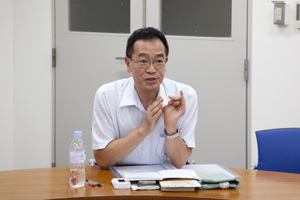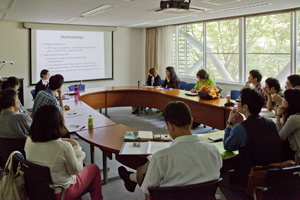
Title: Regulation of Islam in Xinjiang,China
Lecturer: Kara Miriam Abaramson, Adjunct Professor of School of Law,Temple University Japan Campus, Visiting Fellow of Institute for Advanced Studies on Asia,the University of Tokyo
Date: 3/June/2013
Time and Place: 1pm~3pm at the Meeting Room 2, 3rd floor of the Isntitute for Advanced Studies on Asia,the University of Tokyo
Language: English
Participants: 14
Hosted by Regular Research Project of An Attempt at the Integlation of Studies in the Traditional, Modern and Contemporary Chinese Legal System (Prof. TAKAMIZAWA, Institute for Advanced Studies on Asia,the University of Tokyo)
Report:
Kara Miriam Abramson gave a lecture on state regulation of Islam in the Xinjiang Uyghur Autonomous Region, People’s Republic of China. Freedom of religious belief is provided for in the PRC constitution, and Buddhism, Catholicism, Protestantism, Daoism, and Islam are recognized by the state. These religions all face tight state controls, however, and regulation of Islam is especially harsh in Xinjiang, where authorities allege that separatist movements exist among the Muslim Uyghur population.
An array of legal documents and policy directives govern controls over religion in Xinjiang, and Islamic practices are often singled out. Mosques and Muslim religious leaders face tight oversight, while “illegal” religious publications are targeted in censorship campaigns. Other recent campaigns have aimed to stop women from wearing veils and young men from wearing beards. Local directives also have banned students and government workers (including, in some cases, their family members) from observing Ramadan, while ordering restaurants to stay open.
In practice, not all government campaigns have been fully successful, resulting in a gray area for some religious activities outside of state controls. Other restrictions on religion have been effectively implemented, however, and reports detail some cases of Uyghurs in Xinjiang harassed, detained, or arrested in connection to practicing their religion outside of state-approved boundaries.
At the end of her lecture, Abramson provided a case study from Hoten prefecture (和田地区) , Xinjiang, where officials have implemented a system under which villagers and village cadres sign pledges to uphold local village codes of conducts—including provisions regulating religion—and pay fines in event of violating the pledges. Regulating religious behavior has been a centerpiece of this “village pledge system.” Though described as a voluntary pledge, the system appears to amount in practice to a fining mechanism that violates provisions in the PRC administrative punishment law.
Abramson concluded her talk by stressing the importance of examining conditions in Xinjiang, especially in the area of religious regulation, for understanding current obstacles to promoting rule of law in China.
Issues raised during the Question and Answer period included:
- Is the system of village pledges legal, and can it truly be considered a form a contractual agreement, as some Chinese officials have claimed?
- Is the speaker evaluating rule of law trends in China using western models that are not appropriate for China?
- How do conditions in Xinjiang contrast with those in the Middle East and France, especially regarding policies toward religious attire?
|
|
|
|
|
|




